Mary has requested that the daily message be
given each day to the world. It is read nightly at the prayer service from her Image
Building in Clearwater, Florida, U.S.A. This is according to her request. All attempts
will be made to publish this daily message to the world at 11 p.m. Eastern time, U.S.A.
We acknowledge that the final authority
regarding these messages rests with the Holy See of Rome.
|
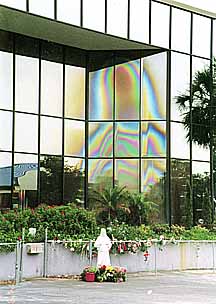 |
November 15, 2000
A Prayer for Intimacy
with the Lamb, the Bridegroom of the Soul
Oh Lamb of God, Who take away the sins of the world, come and act
on my soul most intimately. I surrender myself, as I ask for the grace to let go, to just
be as I exist in You and You act most intimately on my soul. You are the Initiator. I am
the soul waiting Your favors as You act in me. I love You. I adore You. I worship You.
Come and possess my soul with Your Divine Grace, as I experience You most intimately.
Messenger: Include Our Lady of the Holy Spirit
Center in 6:20 prayers.
Messenger: Please pray for 5 urgent intentions!
Messenger: Please pray for the healing of Father Carter
through the intercession of Our Lady of Clearwater.
Messenger: Prayer is so precious to me.
To think God, Father, Son and Holy Spirit dwell within us in a special way when we are
in the state of grace.
Our Divine Bridegroom comes in us, so united to us in Communion.
I am in awe and I love Him so much. I love God so much.
Let us honor Him and love Him and praise Him and tell Him we are so sorry for our sins.
We pray to Him with heartfelt prayer and He listens to us.
Today it was so beautiful at Mass, I was right before the priest and I saw Christ
offering sacrifice to the Father.
I saw the offering of the Body and Blood of Jesus.
I saw the power in the priest to change bread and wine into the Body and Blood of
Christ.
I saw the table of sacrifice.
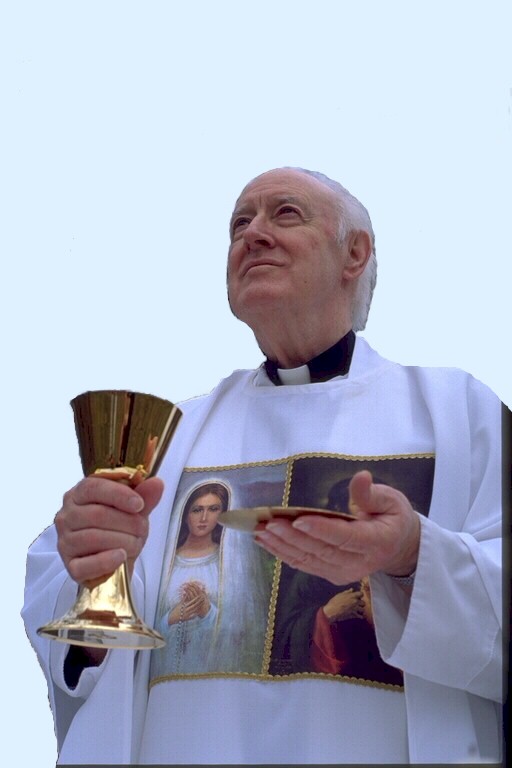
Through Him, With Him and In Him
Messenger: Doesn't your heart burn with love of God and gratitude for the Mass?
Today at Mass I felt that connection with all the members in the Body of Christ united
to the Father, Son and Holy Spirit and I want to hold this moment forever united to all
the angels and saints and the souls in purgatory. It is so big. I feel so deep the
connection of so many united as one with the bonds of deep love in our hearts.
Jesus speaks: I am the Alpha and the Omega, I am your God and your All. I give
Myself so completely to you in the Mass. I AM GOD. Praise, honor and thank Me. I am the
King of the Universe.
Your children are God's children, stay connected to God.
I am the Ultimate Mystery.
Your God is your Creator, you are creatures, I give you great gifts.
I ask you to include the 1st Chapter of Response to God's Love.
Read it slowly, say each word as you ponder it and read it aloud.
Keep it as a reference for yourself.
It is most important.
You are formed more and more in the image of God.
Go to the Immaculate Heart of your Mother, your spiritual womb. Ask for the Holy Spirit
to form you more and more in My image and likeness.
The Incarnation goes on in you.
Genesis 1: 26-27
God said, ‘Let us make man in our own image, in the likeness of ourselves, and let
them be masters of the fish of the sea, the birds of heaven, the cattle, all the wild
animals and all the creatures that creep along the ground.’
God created man in the image of himself,
in the image of God he created him,
male and female he created them.
Messenger: Response to God's Love is a book written by Fr. Carter and
used as a text book for about 16 years at Xavier University. He taught there for over 30
years. He has authored some 17 books and written six years of priestly newsletters which
have been circulated around the world.
Jesus desires this section to be included. This book is so important to Jesus. You will
have greater insights into the Divine Mysteries if you read slowly as Jesus requests and
pray for vision and grace. Oh God, thank You for this great work.
The moment Fr. Carter took his pen in hand God was giving the world a great body of
knowledge to help renew the Church and the world.
Fr. Carter has spiritually directed all of us through his writings and Jesus has
directed him his whole life to help renew the Church and the world.
St. Claude de la Colombiere, St. Margaret Mary, St. Francis, St. Clare, St. Ignatius
and St. Xavier intercede for us, especially for the Jesuits to help us do this work to
help bring about the Reign of the Sacred Heart and triumph of Mary's Heart.
Genesis 1: 26-27
God said, ‘Let us make man in our own image, in the likeness of ourselves, and let
them be masters of the fish of the sea, the birds of heaven, the cattle, all the wild
animals and all the creatures that creep along the ground.’
God created man in the image of himself,
in the image of God he created him,
male and female he created them.

Through Him, With Him and In Him
Excerpt from Response
to God's Love
1
The Mystery of Christ and
Christian Existence
Etymologically, the word mystery basically means that which is secret or hidden. It
was used in a religiously technical sense even before Christianity. Mystery was used, for
example, to designate certain religious rites of pagan Hellenism, secret rites that were
closed to outsiders unless they had been properly initiated into them. In relation to
Egyptian hermeticism, the word mystery was applied to initiation into secret religious
ideas or doctrines. In reference to Christianity, God himself is the ultimate mystery.
Radically, God is completely other and transcendent, hidden from man in his inner life,
unless he chooses to reveal himself. Let us briefly look at this inner life of God.
The Father, in a perfect act of self-expression, in a perfect act of
knowing, generates his son. The Son, the Word, is, then,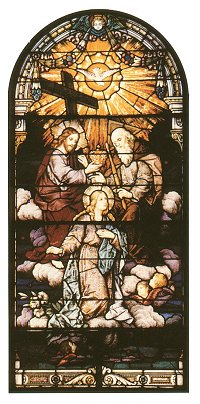 the immanent expression of God's
fullness, the reflection of the Father. Likewise, from all eternity, the Father and the
Son bring forth the Holy Spirit in a perfect act of loving.
the immanent expression of God's
fullness, the reflection of the Father. Likewise, from all eternity, the Father and the
Son bring forth the Holy Spirit in a perfect act of loving.
At the destined moment in human history, God's self-expression, the
Word, immersed himself into man's world. God's inner self-expression now had also become
God's outer self-expression. Consequently, the mystery of God becomes the mystery of
Christ. In Christ, God tells us about himself, about his inner life, about his plan of
creation and redemption. He tells us how Father, Son, and Holy Spirit desire to dwell
within us in the most intimate fashion, how they wish to share with us their own life
through grace. All this he has accomplished and does accomplish through Christ. St. Paul
tells us: "I became a minister of this Church through the commission God gave me to
preach among you his word in its fullness, that mystery hidden from ages and generations
past but now revealed to his holy ones. God has willed to make known to them the glory
beyond price which this mystery brings to the Gentiles—the mystery of Christ in you,
your hope of glory. This is the Christ we proclaim while we admonish all men and teach
them in the full measure of wisdom, hoping to make every man complete in Christ" (Col
1:25-28).
The Christian life, then, is rooted in the great event of the
Incarnation. We must, consequently, always focus our gaze upon Christ, realizing that
everything the Father wishes to tell us has been summed up in the life of Jesus of
Nazareth. It only remains for us, then, to fathom ever more deeply the inexhaustible truth
of the Word Incarnate: "In times past, God spoke in fragmentary and varied ways to
our fathers through the prophets; in this, the final age, he has spoken to us through his
Son, whom he has made heir of all things and through whom he first created the
universe" (Heb 1:1-2).
What was the condition of man and his world at the time of Christ's
coming? In some ways, people were much the same as we are today. There were those who were
just being born into this world of human drama; there were those who, in death, were
leaving it, some of whom had grasped but little of life's meaning. There were those who
were healthy and vigorous; there were those who were sick and lame. Some especially felt
the burdens, the grief, the suffering of the human condition; others were ebullient and
desired all the pleasures that life could provide. There was some good being accomplished:
there was Rome, for example, with her genius for government and architecture; there was
Athens with her philosophers, writers, sculptors, and artists. The moral condition of
those times, however, was at a very low ebb. What St. Paul tells us concerning the time
that immediately followed Christ's earthly existence certainly could also be applied to
the time of his entrance into the world. It is, in short, an ugly picture that Paul
depicts for us (Rm 1:22-32).
Into such a depraved condition of mankind Jesus entered, with a full
and generous heart, to lead man from the depths of sinfulness to the vibrant richness of a
new life in himself. Through his enfleshment, this Christ had become the focal point of
all history. The authentic hopes and dreams of the human family, now so deeply
overshadowed by the ugliness of sin, came converging upon this Christ. He would gather
them up in himself, give them a new luster and brilliance and dynamism, and would lead the
human race back to the Father in the Spirit.
Christ came, then, for a double purpose, or rather for a single purpose
that has two facets. He was radically to release us from the dominion of sin and elevate
us to a new level of existence. This life that Christ has given us is not a type of
superstructure that is erected atop man's human existence. Although nature and grace are
distinct, they do not lie side by side as separate entities; rather, grace permeates
nature. The Christian is one graced person. In his entirety he has been raised up, caught
up, into a deeper form of life in Christ Jesus. Nothing that is authentically human has
been excluded from this new existence. Whatever is really human in the life of the
Christian is meant to be an expression of the Christ-life. The simple but deep joys of
family life, the wonderment at nature's beauty, the kiss that unites lovers, the warm
embrace of a mother for her child, the agony of crucial decision making, the success or
frustration that is experienced in one's work, the joy of being well received by others,
and the heartache of being misunderstood—all these human experiences are intended to
be caught up in Christ and made more deeply human because of him. As Karl Rahner has put
it: "The basic and ultimate thrust of Christian life consists not so much in the fact
that a Christian is a special instance of mankind in general, but rather in the fact that
a Christian is simply man as he is. But he is a person who accepts without reservations
the whole of concrete human life with all of its adventures, its absurdities, and its
incomprehensibilities" (Foundations of Christian Faith, p. 402).
Christ has come, then, not to destroy
anything that is authentically human, but to perfect it by leading it to a graced
fulfillment. This is the meaning of the Incarnation. The more God-like we become through
Christ, the more human we become.
As Christians, then, we live in Christ. We have been incorporated into
his life, into the mystery of Christ. The mystery of Christ is the Christ event,
that is, all the happenings or events of Christ's life, death, and resurrection. We may
speak, consequently, not only of the total, unified mystery of Christ, but also of the
individual events or mysteries. Christ's mysteries of death and resurrection are central
and, in some way, they contain all the other mysteries; but these other mysteries or
events also have their own importance.
The mysteries or events of Christ are not mere past events; they are
still dynamically present in the glorified Christ. How is this so? The mysteries of Christ
have a twofold aspect: one dimension is historical and, therefore, limited by time; the
other dimension is eternal, perennially and actually present in Christ. Let us first
consider the historical, temporal aspect of Christ's mysteries. In assuming a human
nature, the Son subjected himself to the historical dimension of man's existence. In other
words, the actions that Christ performed on earth, through his human nature, were limited
by temporal historicity. The temporal historicity of these acts cannot be
re-enacted—not even sacramentally in the liturgy. To do so would require that God
reproduce a past act now precisely as past, which is a contradiction
in terms.
There is, then, the temporal, not-to-be repeated dimension of Christ's
mysteries. These mysteries, however, possess another aspect, namely, an eternal and
perennially dynamic aspect. Jesus, although he has a divine nature and a human nature, is
only one person—and that is a divine person. The consequence of this fact is
demonstrated in reference to the acts that Christ performed as man. Although they were
enacted through Jesus' human nature, these acts are attributed to the divine person and
share, as much as a human act can, in the eternity of the divine person who is above the
historical, temporal limitations of earthly existence. These events of Jesus' historical
existence endure, then, eternally in the glorified Christ, and they endure for a purpose,
that is, the mysteries of Christ perennially endure in him so that we might assimilate
them. We are thus saved and sanctified by entering into the mystery of Christ,
assimilating it, and reproducing it in our own lives according to our particular
vocations, graces, and historical exigencies. There is only one manner of life that the
Father holds before us, and it is patterned after the existence of his incarnate Son.
By reliving and reincarnating the mysteries of Christ, we are not only
accomplishing our own redemption, but assisting in the continued application of Christ's
redemption to all mankind. The Incarnation continues for all time. Christ, of course, is
the one who fundamentally continues the Incarnation; but he enlists our help. The world no
longer sees Jesus, no longer is able to reach out and touch him. We are the ones who now,
in some way, make Christ visible and tangible. In union with the invisible, glorified
Christ, and depending upon him as our source of strength, we continue the Incarnation in
its visible and temporal dimensions. The fact that, at times, we do this poorly because of
our human weakness and sinfulness does not change the great privilege and responsibility
that is ours: we do, in fact, help continue the Incarnation. We are the Body of Christ. We
must strive ever more perfectly to reincarnate the mystery and mysteries of Christ.
The Christian is initiated into the mystery of Christ, into his or her
role of prolonging the Incarnation, through baptism. In the words of St. Paul: "Are
you not aware that we who were baptized into Christ Jesus were baptized into his death?
Through baptism into his death we were buried with him, so that, just as Christ was raised
from the dead by the glory of the Father, we too might live a new life" (Rm 6:3-5).
It is not sufficient, however, that we be incorporated into Christ and
his mysteries through baptism. All forms of life require nourishment; so too, our life in
Christ must be continually nourished; we must continually keep in contact with Christ and
his mysteries. How can we continually encounter Christ? There are various ways. We contact
Christ in a special manner through the liturgy—above all, in the Eucharistic liturgy.
Here the entire course of salvation history, as centered in Jesus, is sacramentally
renewed and continued. Through this Eucharistic encounter we become more deeply
incorporated into Christ and his mysteries.
The reading of Scripture provides another special opportunity for
encounter with Jesus. This is true for both the Old and New Testaments; the Old Testament
prefigures the New Testament and leads to it. It is obvious, however, that we meet Christ
especially through the pages of the New Testament. How true it is to say that not to be
familiar with Scripture is not to know Christ properly.
There is yet another way in which we encounter the mysteries of Christ;
we make renewed contact with Jesus and his mysteries as these are present within ourselves
and others. The mysteries of Christ that are to be relived by us are structured into our
life of grace. One of the best ways, then, to encounter the mysteries of Christ is to
experience them personally in our own Christian living. To personally relive the mysteries
of Christ is to more perfectly understand them; what is more, this deeper penetration of
their truth allows for their still greater assimilation in our lives. To see the truth of
Christ, the Christ-event, reincarnated to a marked degree in another person—is a
wonderful gift from God. To see the selflessness of Jesus, his love, his kindness, his
willingness to suffer and endure the difficult, his joy and peace despite the pain and
anguish of life—to see all this reflected in the lives of at least some of the people
we meet is indeed a significant encounter with Christ.
Common to the various ways of properly encountering Jesus and his
mysteries is a certain degree of prayerful reflection. Our encounter with the mystery of
Christ in the liturgy, in Scripture, in ourselves, and in others will not be all that it
should be without this kind of reflection. The light of prayer enables us to see more
perfectly how the mysteries of Jesus are to be assimilated. The strength of prayer
provides us with a greater determination to live a more Christ-like existence.
We live out our assimilation to Christ in an atmosphere of love.
Indeed, the life that Jesus has given us is centered in love; it has its origins in the
mysterious love of God, his agape, through which he achieves his self-communication to us.
In the words of St. John's gospel:
Yes, God so loved the world
that he gave his only Son,
that whoever believes in him may not
die
but may have eternal life.
—Jn 3:16.
Our new life in Christ has arisen out of God's fathomless love, and,
what is more, its entire dynamism breathes love. The Incarnate Word himself has taught us
this. On our behalf, Christ, as man, has perfectly opened himself to the Father's love; he
has then responded to the Father in love. In relation to men, Jesus has loved completely
from the depths of his being, pouring himself out in a life of selfless service, a
self-giving that drew from him life's breath itself so that he could say he
loved—without reserve and to the end. Thus forever was etched upon the pages of man's
history—indelibly and so deeply—the love of Jesus for mankind. In this very
greatness and depth of Christ's love for us, he was also opening himself to our love, for
he can enter the human heart only if there is a response of love that encounters his own.
Consequently, Jesus is the sacrament—the visible sign—of the great dimensions of
Christian love. Christians are the persons who receive God's love and respond with their
own love; Christians also love their fellow human beings as themselves and, in turn, open
themselves to receive others' love.
Christ, in his descent into human flesh, has established a milieu of
love. The life he came to give can flourish only in the framework of love. Indeed, we can
summarize the meaning of the Christian life by stating that it is a response to God's
love—a love that God freely gives to us without conditions or qualifications. Love is
the beginning and the end. The main truth that we must comprehend is that the redemptive
incarnation was wrought by God's love to raise us, in turn, to a deeper level of loving.
Our further penetration into the mystery of the Incarnation can take place only in love.
Incarnate love can only be understood and participated in more fully through our own life
of love.
Another characteristic of our assimilation to the mystery of Christ is
its personalism. There were numerous possibilities open to God, given his decision to
redeem the human race. He actually chose, however, to accomplish our redemption in the
most personalistic way; he communicated himself to us through the personal enfleshment of
his Son. This means that God was giving himself to us through the warmth, the kindness,
the strength, the gentleness, and the selflessness that emanated from the incarnate person
of Christ. It was truly the incarnate, personal acts of Christ that redeemed us—his
work and relaxation, his joy, his friendships, his love for Mary and Joseph, the training
of the apostles, his concern for the most abject of those he encountered, his fatigue, his
agony and death, and his resurrection. Our redemption was truly personalistic.
Moreover the personalism of the Incarnation continues. In union with
Christ, we are called upon to help him continue his Incarnation in its visible, earthly
dimension. Only one framework is available to us according to which we can help further
the Incarnation—our personal lives, that is to say, our lives as individuals united
as a people, the People of God. The human condition as we experience it—joyfully and
painfully, too—also provides the soil for our participation in the continued
Incarnation. Redemption continues to take place not when we try to remove ourselves from
the human condition, but when we strive to live an authentically human life that is more
and more in Christ. It is by living truly personalistic lives—that is, lives
springing forth from the greatness of the person as created and redeemed by God, lives
that do not flinch from the human condition—that redemption continues to be made
visible to this world.
Christian personalism centers in our personal relationships with God
and others, and again, Christ shows the way. Through the Word made flesh, the life of the
Trinity has incarnationally manifested itself to mankind. The life of the Trinity centers
in the personal relationships between Father, Son, and Holy Spirit; but God's life is also
his love gone out to the human race. The Incarnation projects this Trinitarian life into
the temporal sphere. Jesus has come to tell us about Trinitarian life, to give us a share
in it, to teach us that through grace we share in God's life—a life of
relationships—by entering into deepened personal relationships with God and other
persons. Redemption that is received and contributed to is the experience of these
relationships. In other words, as Jesus has told us, the Christian life is summed up in
love of God and neighbor. Out of these personalized love relationships flow many things;
for example, redemption continued is the loving abandonment to the love of God that
despite possible fear, allows a person to accomplish things that are totally beyond his or
her natural courage. Or again, redemption continued is loving those who are afar off whom
I will never see or know, but whom I know are my brothers and my sisters and whom my work
and prayer can reach out and touch. Or again, redemption continued is the Christian hope
and trust that allows man and woman to take the risk of the mutual self-giving that is
marriage. Or again, redemption continued is the black person who continues to relate to
his or her white neighbors in faith, hope, and love despite temptations to hatred and
bitterness. Or again, redemption continued is the ecstasy and the agony of loving and
being loved. Truly, the Incarnation visibly continued is our Christian faith, hope, and
love made alive in our personal relationships with God and man.
the Word made flesh, the life of the
Trinity has incarnationally manifested itself to mankind. The life of the Trinity centers
in the personal relationships between Father, Son, and Holy Spirit; but God's life is also
his love gone out to the human race. The Incarnation projects this Trinitarian life into
the temporal sphere. Jesus has come to tell us about Trinitarian life, to give us a share
in it, to teach us that through grace we share in God's life—a life of
relationships—by entering into deepened personal relationships with God and other
persons. Redemption that is received and contributed to is the experience of these
relationships. In other words, as Jesus has told us, the Christian life is summed up in
love of God and neighbor. Out of these personalized love relationships flow many things;
for example, redemption continued is the loving abandonment to the love of God that
despite possible fear, allows a person to accomplish things that are totally beyond his or
her natural courage. Or again, redemption continued is loving those who are afar off whom
I will never see or know, but whom I know are my brothers and my sisters and whom my work
and prayer can reach out and touch. Or again, redemption continued is the Christian hope
and trust that allows man and woman to take the risk of the mutual self-giving that is
marriage. Or again, redemption continued is the black person who continues to relate to
his or her white neighbors in faith, hope, and love despite temptations to hatred and
bitterness. Or again, redemption continued is the ecstasy and the agony of loving and
being loved. Truly, the Incarnation visibly continued is our Christian faith, hope, and
love made alive in our personal relationships with God and man.
In our assimilation to the mystery of Christ, then, we learn about love
and the personalistic. We also learn a further truth—the value of the material, the
tangible, in God's plan of redemption. The Incarnation established a set pattern for the
redemption of the world, that is, redemption taken both objectively (the historical,
salvific life of Christ) and subjectively (the redemption as applied to mankind). Christ
redeemed the world through his humanity, which was a created and, in part, a tangible
reality. As Jesus' humanity was indispensable for accomplishing the objective redemption,
so also created things are necessary for continuing the subjective redemption. An
outstanding example of this occurs in the Eucharistic liturgy, for bread and
wine—material, tangible realities—are the central focus of the liturgical rite
as they are changed into Christ's body and blood.
In assuming a human nature, then, Jesus
has united to himself not only mankind, but also the material world. Not only the human
spirit, but also the human body and the material world have been given a new dignity
because of the Incarnation and enter so vitally into the Incarnation continued. Once for
all let us lay aside the influence of Manichaeism, Gnosticism, and similar false teachings
that denigrate that which is material. It is obvious that we do not always properly use
material creation; at such times, we have failed to relate to material creation according
to God's will. Let us remember, then, that Christ, in elevating the material to a new
dignity, has accomplished this partially through that aspect of the Incarnation that is
the cross—a dimension of the Incarnation that, along with its other aspects, must
also be present in our encounter with the material. We must realize that such elements as
Christian self-discipline and renunciation must find a place in our lives if we are to use
material creation according to God's designs.
There are numberless applications of the value of the material, the
visible, the tangible, in our Christ-lives: there is, for example, the warm, receptive
smile of a friend and the reading of Scripture and the physical love of husband and wife
and the exhilarating refreshment of a day at the seashore and God's loveliness that is
reflected in a little child—and, of course, the list could continue on. The
fundamental principle, however, is the same in all cases:—the human nature of Jesus,
something that has been created and is in part material, has reached out and touched all
these other things and experiences that are part of life in a material world. When we
properly relate to them, they become for us extensions of the Incarnation. They are the
redemptive Incarnation applied to us; in addition, they are opportunities for us to assist
Christ in continuing his Incarnation for others.
The Incarnation, as we have briefly pointed out, was and is a rich and
varied event. The truths that accompany Christ's descent into our world are numerous and
capable of not only originally elevating us to a new life, but also constantly leading us
to a deeper, richer, and more vibrant participation in that life. This is why Christ came
to live in our midst—to give us life in abundance:
The Word became flesh
and made his dwelling among us.
. . . . . . . . . . . . . . . . . . . . . . . . .
Of his fullness
we have all had a share—
love following upon love.
—Jn 1:14-16
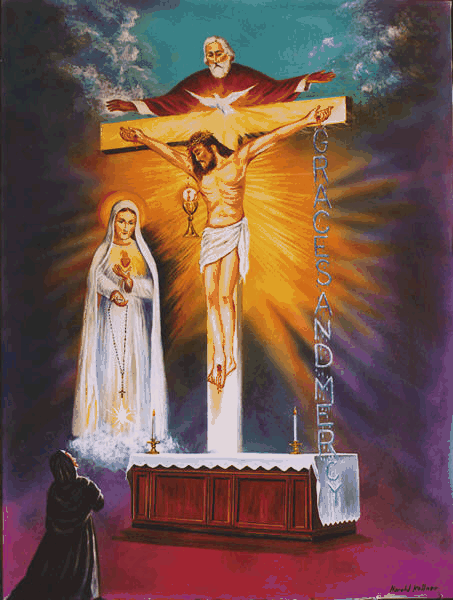
We help in the act of redemption by giving our lives to
God and offering them as a sacrifice for sins through the Hearts of the New Adam and the
New Eve.
Messenger: The Incarnation goes on in us.
Here is our Mother -- she appears to us.
The Lady Clothed with the Sun --
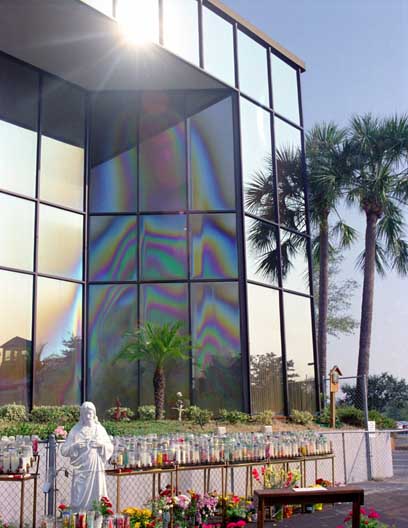
November 5, 2000
A Rosary for Healing or for Someone with Cancer.
On one Hail Mary bead or as many as you desire, say: (this is given for Fr. Carter, you
can replace your loved one's name).
May God heal Fr. Carter through the intercession of Our Lady of Clearwater in
union with the Mass and all the Masses being celebrated around the world.
Pray the Hail Mary or Hail Mary's then pray this after the Hail Mary.
May the cancer be uprooted and thrown into the sea.
We believe with all our hearts.
After the Glory Be— pray the following petition.
May Fr. Carter be healed through the intercession of Our Lady of Clearwater
if it be the holy will of God.
Note: You can look at Mary on the image rosary while you pray this rosary.


Note: The above section can be printed out from a PDF file, and you can pray the rosary looking at
the pictures.
Messenger: CAN YOU HELP US BY GIVING US ROSARIES FOR THE SCHOOLS
REQUESTING THEM?
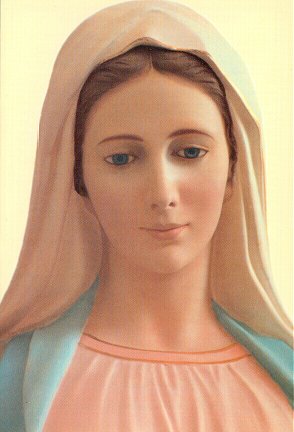
Mary speaks: PLEASE MAKE WALTER'S ROSARIES. THE
SCHOOLS WANT ROSARIES AND THERE ARE NOT ANY ROSARIES LEFT.
Messenger: Social at the Morrow, Ohio, Center after 6:20 p.m.
prayers and rosary on Friday, November 17, 2000.
Messenger: There will be a special rosary in Sidney, Ohio, at
6:20 p.m. on Tuesday, November 21, 2000. Please call 1-888-211-3041 for more information.
Messenger:
Rosary in Clearwater, Florida - December 5, 2000.
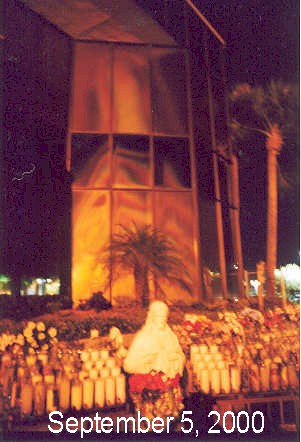
Messenger: ALL APOSTLES THAT CAN COME ON DECEMBER 17, 2000 TO FLORIDA
- 4TH ANNIVERSARY OF MARY'S APPARITION ON THE BUILDING IN CLEARWATER, FLORIDA.
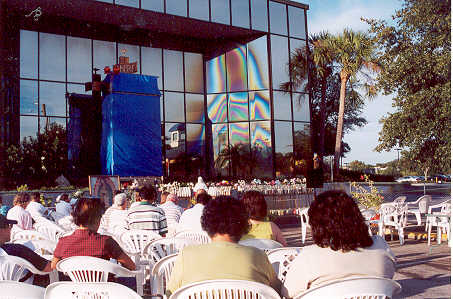
Messenger: Mary wants the Red Rosary Book printed. It will cost
$12,000 - $14,000 to get them reprinted.

Messenger: Pray for Perry.
Prayer List for apostles for interior use in the
Movement. Pray hourly.
Spread the Blood of Jesus on everyone, consecrate their hearts, cast the devil
out, pray for coming of the Holy Spirit in a special way for all people involved on this
list.
Pray Father Carter is healed through Our Lady of Clearwater.
Pray for Father Carter's doctors.
Please pray for one new very important intention.
Pray for all involved in buying the building.
Pray for designated priests, Fr. Mike, Fr. Smith, Fr. Ken, all priests involved in the Imprimaturs
translations including all bishops. Pray for Fr. Joe, Bishop Ed, Fr. Don, Father at
Tuesday Masses, Fr. Tom, Fr. Bill, all priests involved with Walter, Fr. Hagee and special
priests.
Pray for Father's sister Merle, for all of us servants, handmaids, apostles and vocations
to all 7 categories.
Pray for the elections.
Pray for an audience with the Pope.
Pray for all Jesuits involved, all those over us. Pray for the 4 urgent intentions.
Pray for the rights to the books.
Pray for the process of getting Father's books on the Internet.
Pray for money to reprint the books.
Pray for the Imprimatur on the Priestly Newsletter Book II.
Pray we can send it to all bishops and Jesuits.
Pray for Perry and family and discernment.
Pray for all sub-centers and all out-of-state rosaries.
Pray for the sisters' mailing, nursing home mailing, bus mailing.
Pray for Rosary Factory.
Pray for Genevieve's daughter and Sheila's mom and Jerry's dad, Bernice's daughter.
Pray for Paul and Joan discernment.
Pray for all book covers.
Pray for B & M and Tina and Terry, all printing jobs, companies involved.
Pray for 5th, the 13th, the 17th.
Pray for the Internet team and the daily messages.
Pray for building up of Morrow, Ohio, Dale, Indiana, other sub-centers.
Pray for the Holy Spirit Center and all involved.
Pray for all our families, children in school, college mailing.
Pray for lots of rosary makers and rosaries for the schools.
Pray for funds and grace.
Pray for Paul C., Margaret Mary, Steve and Sheila, Monica, Angie, Marian, Cathy, Joe,
Nick, Mary, Emily, Joe, Doris, Glaci, Dunkers, Joan R., Morgan, Mark, Walter, Janice, Mike
A., Margaret, Ron, and Harold.
Pray for Fred doing the paper and all involved in priestly "start-up".
Please pray for all Shepherds of Christ children.
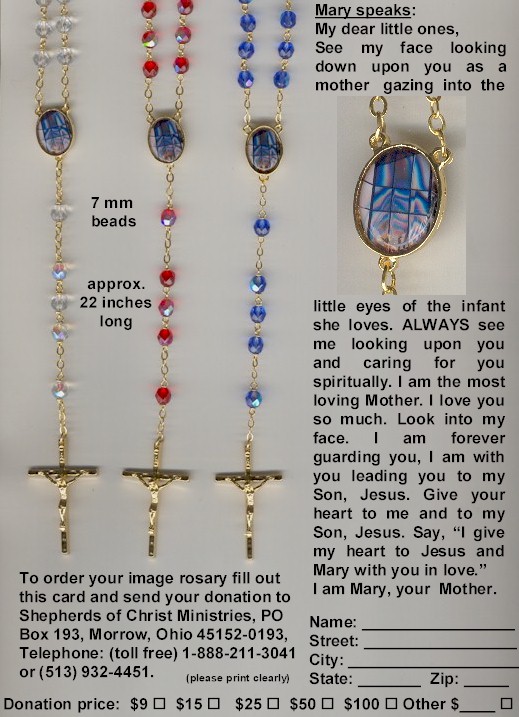
(Please copy and pass out to family and friends.)
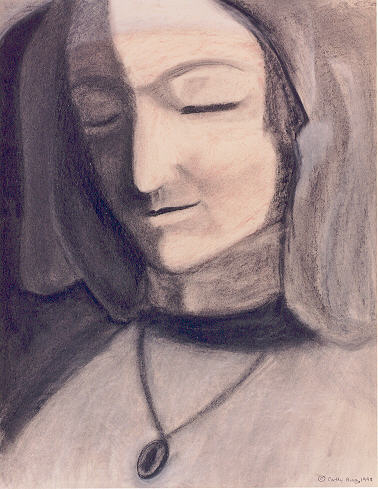 Mary's
Message from the Rosary of August 27, 1996
Mary's
Message from the Rosary of August 27, 1996
Mary speaks: I stood beneath the cross
of my Son, and my Heart was in such pain for I saw Him before my eyes. I saw Him covered
with blood. I saw Him die. My Heart, my children, my Heart to watch my Son, but my Heart,
my Heart, how I suffered for my little children of the world that give in to this world
and give up the love of my Son. O my little children of light, I give you this message.
Carry this light into the darkness for your Mother Mary, for I stood beneath the cross and
I cried. I cried for the little ones. I cried for the young ones, the ones that do not
care and will lose their souls. How do I make you see for you will not listen to me? What
can I do? I come. I appear. I beg. I plead. I give you these gifts from my Son, and you
reject me. I do not deliver messages very often anymore for I have been ignored. The
message is the same. You do not read the messages I have given to you. Please help me.
Help the little children. I appear. I appear. I appear, and I am ignored. I stood beneath
the cross, and I cried. I cried, and my Heart was in such anguish for my little children,
for I am searching for them this day as I searched for the Child Jesus. Please, please
help me. I cannot hold back the hand of my Son any longer. I am Mary, your Mother. I ask
you to help my children. You are my children of light.
Song: O Lady of Light, shining so bright,
be with us this day, guiding our way, O Lady, O Lady of Light.
Mary speaks: I appear to you as
Our Mother of Sorrows.
(End of Mary's Message)
MY
VALENTINE FOR JESUS AND MARY
AND THE WORLD
I _________________ give my
heart to
You Jesus and Mary on this day
_________________
I promise to help spread the devotion to
the Hearts of Jesus and Mary.
   |
Question for married couples and others in intimate
relationships:
Q: What can I do to help us be more united?
Table of Contents
Previous Daily Message
Main Shepherds of Christ Page
 Copyright
© 2000 Shepherds of Christ.
Copyright
© 2000 Shepherds of Christ.
Rights for non-commercial reproduction granted:
May be copied in its entirety, but neither re-typed nor edited.
Translations are welcome but they must be reviewed for moral and theological accuracy by a
source approved by Shepherds of Christ Ministries before any distribution takes place.
Please contact us for more information.
All scripture quotes are from the New Jerusalem Bible, July 1990, published by Doubleday.
Revised: November 15, 2000
URL: http://www.SofC.org
Contact Information for Shepherds of Christ
Email: info@SofC.org
Shepherds of Christ Ministries
PO Box 193
Morrow, Ohio 45152-0193
Telephone: (toll free) 1-888-211-3041 or (513) 932-4451
FAX: (513) 932-6791

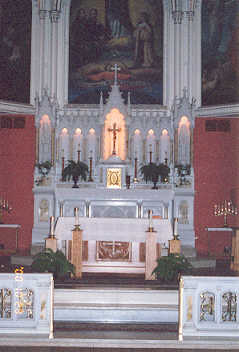
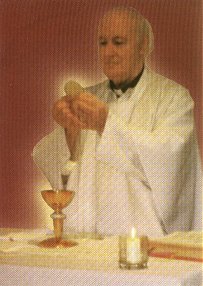

 the immanent expression of God's
fullness, the reflection of the Father. Likewise, from all eternity, the Father and the
Son bring forth the Holy Spirit in a perfect act of loving.
the immanent expression of God's
fullness, the reflection of the Father. Likewise, from all eternity, the Father and the
Son bring forth the Holy Spirit in a perfect act of loving. the Word made flesh, the life of the
Trinity has incarnationally manifested itself to mankind. The life of the Trinity centers
in the personal relationships between Father, Son, and Holy Spirit; but God's life is also
his love gone out to the human race. The Incarnation projects this Trinitarian life into
the temporal sphere. Jesus has come to tell us about Trinitarian life, to give us a share
in it, to teach us that through grace we share in God's life—a life of
relationships—by entering into deepened personal relationships with God and other
persons. Redemption that is received and contributed to is the experience of these
relationships. In other words, as Jesus has told us, the Christian life is summed up in
love of God and neighbor. Out of these personalized love relationships flow many things;
for example, redemption continued is the loving abandonment to the love of God that
despite possible fear, allows a person to accomplish things that are totally beyond his or
her natural courage. Or again, redemption continued is loving those who are afar off whom
I will never see or know, but whom I know are my brothers and my sisters and whom my work
and prayer can reach out and touch. Or again, redemption continued is the Christian hope
and trust that allows man and woman to take the risk of the mutual self-giving that is
marriage. Or again, redemption continued is the black person who continues to relate to
his or her white neighbors in faith, hope, and love despite temptations to hatred and
bitterness. Or again, redemption continued is the ecstasy and the agony of loving and
being loved. Truly, the Incarnation visibly continued is our Christian faith, hope, and
love made alive in our personal relationships with God and man.
the Word made flesh, the life of the
Trinity has incarnationally manifested itself to mankind. The life of the Trinity centers
in the personal relationships between Father, Son, and Holy Spirit; but God's life is also
his love gone out to the human race. The Incarnation projects this Trinitarian life into
the temporal sphere. Jesus has come to tell us about Trinitarian life, to give us a share
in it, to teach us that through grace we share in God's life—a life of
relationships—by entering into deepened personal relationships with God and other
persons. Redemption that is received and contributed to is the experience of these
relationships. In other words, as Jesus has told us, the Christian life is summed up in
love of God and neighbor. Out of these personalized love relationships flow many things;
for example, redemption continued is the loving abandonment to the love of God that
despite possible fear, allows a person to accomplish things that are totally beyond his or
her natural courage. Or again, redemption continued is loving those who are afar off whom
I will never see or know, but whom I know are my brothers and my sisters and whom my work
and prayer can reach out and touch. Or again, redemption continued is the Christian hope
and trust that allows man and woman to take the risk of the mutual self-giving that is
marriage. Or again, redemption continued is the black person who continues to relate to
his or her white neighbors in faith, hope, and love despite temptations to hatred and
bitterness. Or again, redemption continued is the ecstasy and the agony of loving and
being loved. Truly, the Incarnation visibly continued is our Christian faith, hope, and
love made alive in our personal relationships with God and man.








 Mary's
Message from the Rosary of August 27, 1996
Mary's
Message from the Rosary of August 27, 1996

